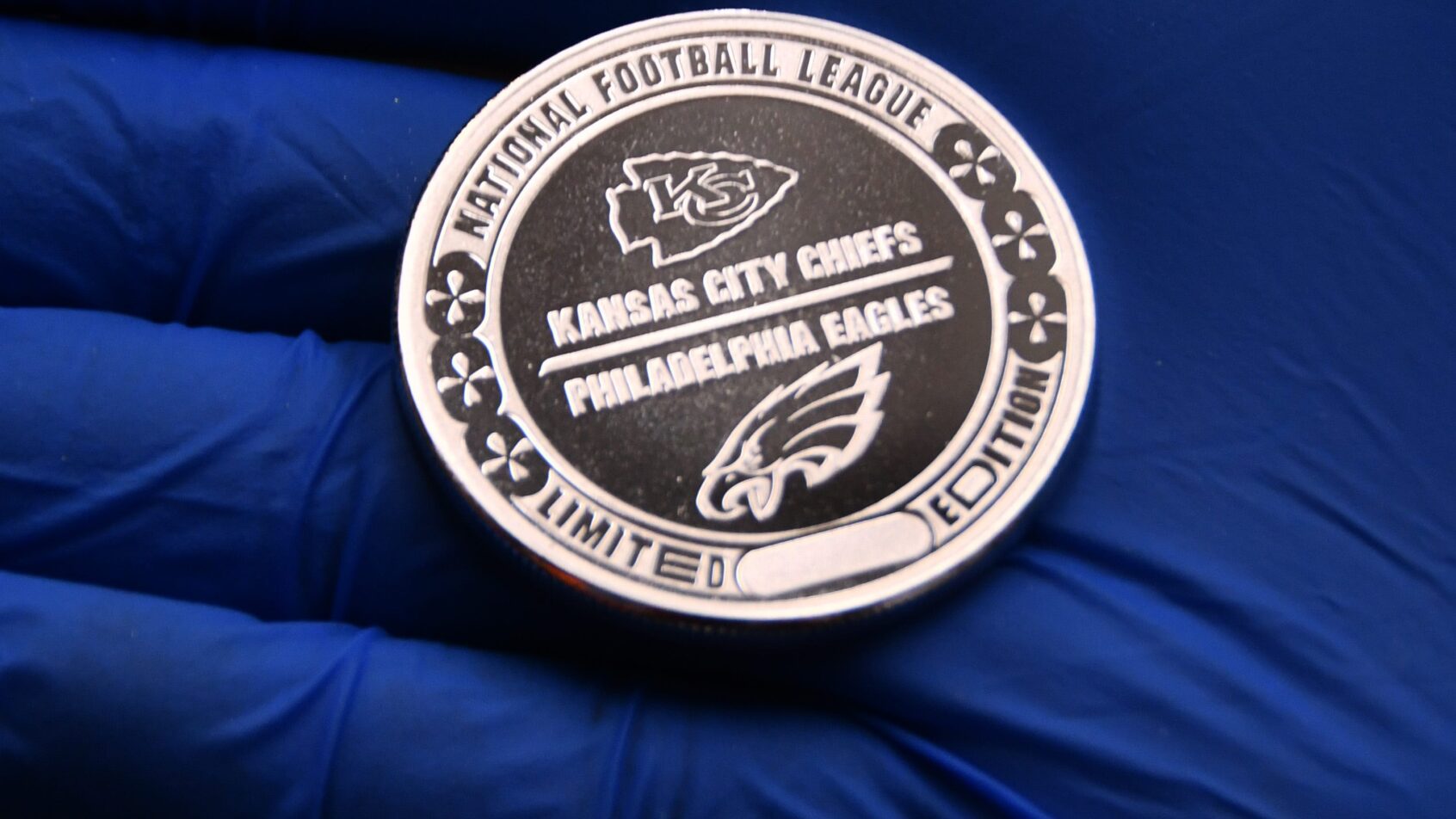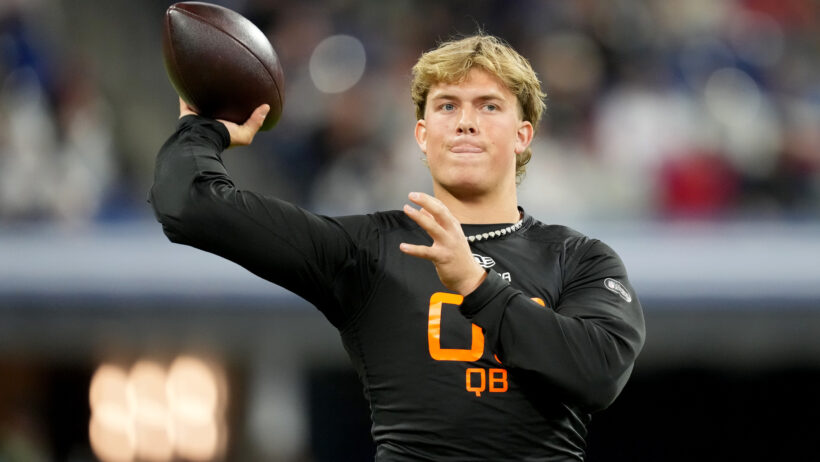Massachusetts to Allow Coin Flip Bets for Super Bowl
By Robert Linnehan in Sports Betting News
Published:

- The Massachusetts Gaming Commission voted to allow coin-flip bets for the Super Bowl
- Massachusetts regulators voted 3-2 to allow the new betting markets
- The commission voted down the markets last year
Heads? Tails? You will likely be able to bet on either in the commonwealth of Massachusetts during the upcoming Super Bowl.
The Massachusetts Gaming Commission voted 3-2 to allow licensed sports betting operators to accepts several betting markets on the Super Bowl coin flip.
Operators will be able to offer coin toss result, coin toss winner, and coin toss call result bets for Sunday’s game against the Philadelphia Eagles and Kansas City Chiefs.
- BETMGM SPORTSBOOK
USE CODE SBD1500 & GET $1,500 BACK IN BONUS BETS
- BET365 SPORTSBOOK
BET $5 & GET $150 IN BONUS BETS WITH CODE DIME365
- FANATICS SPORTSBOOK
BET & GET UP TO $1,000 IN BONUS BETS!
- DRAFTKINGS SPORTSBOOK
BET $5 & GET $200 IN BONUS BETS INSTANTLY!
- FANDUEL SPORTSBOOK
BET $5 & GET $250 IF YOUR BET WINS
- CAESARS SPORTSBOOK
USE CODE SBD2DYW & BET $1 TO DOUBLE THE WINNINGS ON YOUR FIRST 10 BETS!
Must be 21+. GAMBLING PROBLEM? Call 1-800-GAMBLER (CO, IL, KS, KY, MD, MI, NC, NJ, OH, PA, TN, VA, VT, WV, WY); (800) 327-5050 or gamblinghelplinema.org (MA); (877) 8-HOPENY (NY); 1-800-NEXT-STEP (AZ); (888) 789-7777 (CT); 1-800-BETS-OFF (IA); 1-800-9-WITH-IT (IN); mdgamblinghelp.org (MD); morethanagame.nc.gov (NC); 1800gambler.net (WV)
Flipped Outcome From Last Year
Commissioner Brad Hill brought the issue back again to the MGC, sharing a story about how a fan at a recent basketball game he refereed yelled at him from the stands asking if the state would allow coin flip bets during the Super Bowl.
Commission members actually flipped their results last year’s Super Bowl when they voted down the same proposal to allow coin flip bets by a vote of 2-3.
Commissioner Paul Brodeur swung the vote in favor of coin flips this year, as he and Commissioners Jordan Maynard and Hill voted for the new sports betting markets.
“It’s not something that can be gamed, so I’m comfortable moving forward with this,” Brodeur said.
Hill and Maynard voted in favor of the markets last year, but former MGC Chair Cathy Judd-Stein and Commissioners Eileen O’Brien and Nakisha Skinner voted against the proposal.
O’Brien pointed to the fact that no operators have petitioned the commission to add the bets to their sports betting catalogues. It’s not a “big revenue driver,” she said, and doubts that anyone will be flocking to the unregulated markets or driving across state lines to place a bet on a coin flip.
Maynard stressed that operators should not offer the bets on short notice if they can’t offer them according to state gaming regulations.
PENN, Caesars Face Noncompliance Issues
The MGC heard three noncompliance issues, two involving Caesars and one with Penn Sports Interactive.
Penn Sports Interactive, who is partnered with ESPN BET for online sports betting in the commonwealth, allegedly sent marketing materials to eight individuals who signed up for the state’s voluntary self-exclusion list. The sportsbook also send marketing material to 36 individuals who had self-excluded with ESPN BET, but had been active at some point in Massachusetts.
Investigations and Enforcement Bureau (IEB) general counsel Zachary Mercer noted that Penn Sports Interactive self-reported the incident. The company became aware of the error after a consumer complaint from a separate jurisdiction prompted an investigation.
Penn Sports Interactive reported the issue was due to human error from their marketing team “checking or unchecking appropriate boxes to filter communications sent to patrons.”
The MGC unanimously agreed to send the issue back to the IEB for further investigation and a recommendation on how to move forward.
The MGC also sent a noncompliance incident with Caesars Sportsbook back to the IEB for further investigation regarding the sportsbook’s knowledge based authentication question requirements.
Mercer explained to the commission that Caesars Sportsbook was out of compliance with the state’s knowledge based authentication question requirements from Sept. 1, 2023, through April 9, 2024.
Mercer said Caesars Sportsbook believed it had been in compliance with the state regulation during that time period after several discussions with the regulatory body.
Caesars believed it was in compliance with regulations until the sports wagering division informed them they were not in July 2024. They reported they had no intent to willfully disregard non-compliance.
Finally, the MGC agreed to hold an adjudicatory hearing for Caesars regarding an incident in which the sportsbook accepted bets on “total red cards” in a 2024 UEFA soccer tournament. Caesars Sportsbook accepted six bets between June 27, 2024 and July 9, 2024 for a total stake of $8,270.
State law prohibits bets on injuries, penalties, player discipline, or play review.
The erroneous bets were not reported by Caesars Sportsbook. The sports wagering division informed the company they were offering prohibited bets.
The MGC decided on an adjudicatory hearing without sending the incident back to the IEB for further investigation.

Regulatory Writer and Editor
Rob covers all regulatory developments in online gambling. He specializes in US sports betting news along with casino regulation news as one of the most trusted sources in the country.




